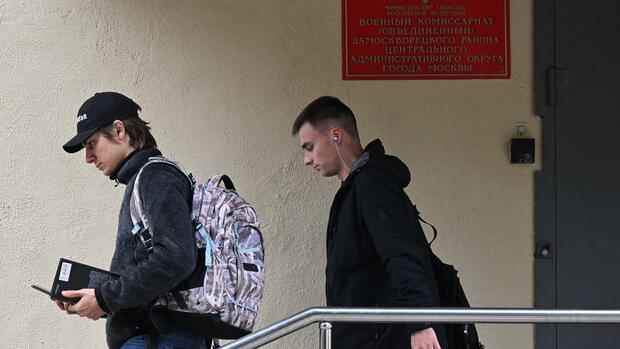300,000 reservists are to be called up.
(Photo: IMAGO/SNA)
In a TV speech, Russian President Vladimir Putin ordered a partial mobilization of his own armed forces. Stefan Meister, Russia expert at the German Council on Foreign Relations (DGAP), sees this primarily as a “liberation blow” by the President inwards. “Now it’s clear: he doesn’t want negotiations, but further escalation,” he says.
Herr Meister, are we witnessing the start of a new phase in the war of aggression against Ukraine with Russia’s partial mobilization?
Putin has made a directional decision. He has come under pressure from the loss of territory in Ukraine. For him, the partial mobilization is now a liberation, especially internally. Now it is clear: He does not want negotiations, but further escalation.
Russia expert of the German Society for Foreign Relations (DGAP)
(Photo: Robert Bosch Center)
Towards a nuclear war?
We shouldn’t take Putin’s threats too seriously, we know them from the past. If parts of occupied Ukraine are annexed, he can station nuclear weapons there. Here, however, Putin is concerned with deterrence in order to secure his territorial gains. It drives up the price of an attack.
But I think a nuclear war with NATO is unlikely, as is the use of strategic nuclear and chemical weapons in Ukraine. That would jeopardize support from India and China, and it would escalate further with the West. Also, he would create problems for his own army with contamination. The question is whether Putin has a red line.
Top jobs of the day
Find the best jobs now and
be notified by email.
What could that look like?
Hard to say. An attack on Crimea could be a red line. If Putin’s army continues to lose and there are major defeats – for example in Donetsk or Luhansk – I can well imagine that Putin’s course will be even more questioned in his own country. Then he has either the regional use of nuclear weapons; but I think that’s unlikely. Or he decides to de-escalate and take a break from the war. Or he comes under pressure from the system, which can no longer support this escalation because the costs are too high.
The Greens are already calling for the supply of heavy weapons to be intensified. The right course?
This is a difficult decision because it turns the spiral of escalation upwards. But we will have no choice but to support Ukraine with more weapons. Anything else would be a mistake at a point where Ukraine is making military advances. Without losing territory, Putin will not give up, he has his back to the wall due to the gains in territory and will come under further pressure as a result of Ukraine’s successes.
Will the partial mobilization actually strengthen the Russian army in Ukraine?
I don’t see any real strategic benefit from partial mobilization. It will take months to mobilize the soldiers. There will be resistance in the regions that have to organize this. Trainers are missing because they are in combat. Weapons are also missing. The partial mobilization creates new cannon fodder.
In Russia there are protests against the decision. Do you think a coup is possible?
Partial mobilization is certainly very unpopular, as the protests show. There will also be a wave of young men emigrating. But I cannot imagine that there will be a putsch or a popular uprising. The structure for that is missing. But as the Russian army loses territory, the pressure on Putin will increase.
Mr. Master, thank you very much for the interview.
More: Putin spreads fear – whoever falls for it loses
